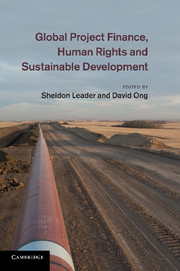Book contents
- Frontmatter
- Contents
- contributors
- Abbreviations
- Part I The framework
- 1 An introduction to the issues
- 2 The linkages between project finance and sustainable development
- 3 Project finance and the relevant human rights
- 4 Applying international environmental principles to project-financed transnational investment agreements
- Part II Special topics
- Part III Case studies
- Index
- References
1 - An introduction to the issues
Published online by Cambridge University Press: 07 September 2011
- Frontmatter
- Contents
- contributors
- Abbreviations
- Part I The framework
- 1 An introduction to the issues
- 2 The linkages between project finance and sustainable development
- 3 Project finance and the relevant human rights
- 4 Applying international environmental principles to project-financed transnational investment agreements
- Part II Special topics
- Part III Case studies
- Index
- References
Summary
To someone interested in the social and environmental impact of foreign direct investment (FDI), a focus on project finance (PF) might seem to be a small corner of concern, not worth straying into for too long. That would be a mistake. The closer one looks at the relationships between corporate decision making, lenders’ disciplines and the social and environmental impacts of projects, the more the techniques of PF emerge as important forces at work when human rights and environmental values are at stake.
PF provides a set of refined tools for the spreading and mitigating of risks between corporations, host states, lenders and those contractors involved in building and operating a project. At the same time, civil society is producing its own increasingly refined tools for measuring the potential gains and losses to the populations affected by this investment strategy. PF has arguably become one of the most closely watched modes of international finance, as various bodies assess the risk to social and environmental standards by projects to which this form of lending is extended. There are positive and negative elements in the picture. Positively, the finance provided in this way has sometimes provided a bridge to very large social gains, generating revenues that give host governments the space to fund major work in housing, health care and education. Negatively, praise is sometimes brought up short by those whose lives are overturned by a project because of its pollution; accidents during its construction or operation; seizure of lands; and many other impacts. In short, PF provides a prism through which pass many of the fundamental tensions characterizing the relation between basic rights, sustainable development and foreign direct investment.
- Type
- Chapter
- Information
- Publisher: Cambridge University PressPrint publication year: 2011
References
- 2
- Cited by



